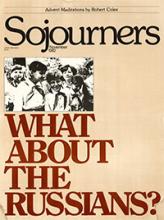November 28
First Sunday In Advent
Psalm 25:1-10; Jeremiah 33:14-16; 1 Thessalonians 3:9-4:2; Luke 21:25-36
Faith has to do with time, with moral anticipation. We are the creatures who look forward, struggle with time's constraints and possibilities. We are the creatures who wonder: what next, and why, and what to do, and whither - again, our time-bound selves demonstrating moral inquiry.
The psalmist pleads for God's instruction. The prophet foresees days of righteous glory, a welcome change indeed from the iniquity he has noticed so scrupulously and condemned with all his might and considerable eloquence. The disciple recalls Jesus himself telling of the future - its promise, but its mystery, too; and the disciple links the future to the present, as do the Old Testament teachers, who know that to wait is to watch - oneself as well as the skies for their signs. Finally, the itinerant early convert yearns for that great, blessed day, a reunion with God, and as his predecessors did, connects that future with the continuing present of our collective lives: how shall we live if we are to meet God and his judgment?
A great privilege of my young life was a friendship with the old and ailing Dr. William Carlos Williams. In life, as he talked, as in many of his poems, Williams constantly mentioned the tension between art and conduct; a matter, he once put it, of time: "We say something pious, and we mean it, but in a moment we forget it, because we become the heartless cutthroats we also have it in ourselves to be."
Read the Full Article

